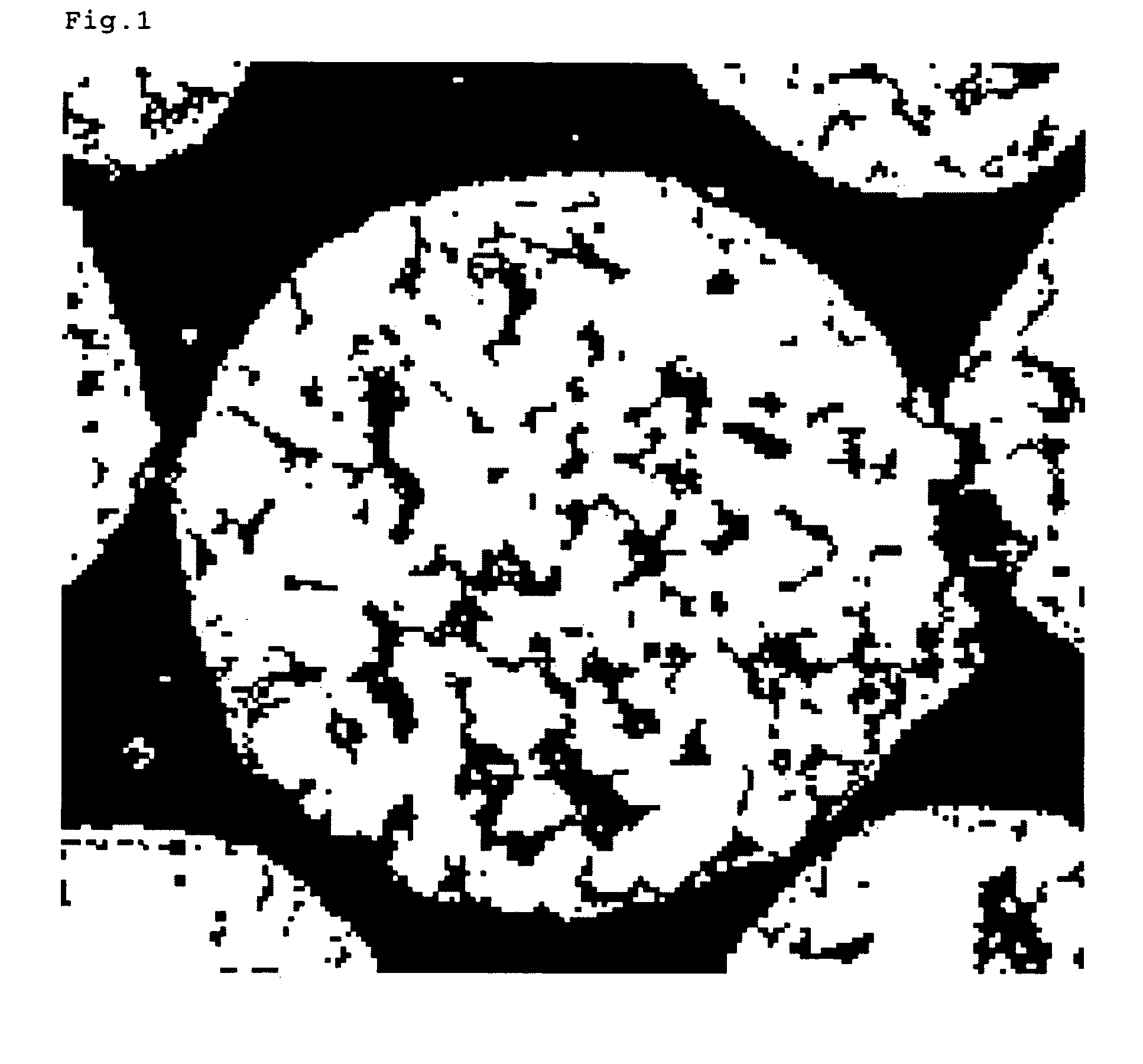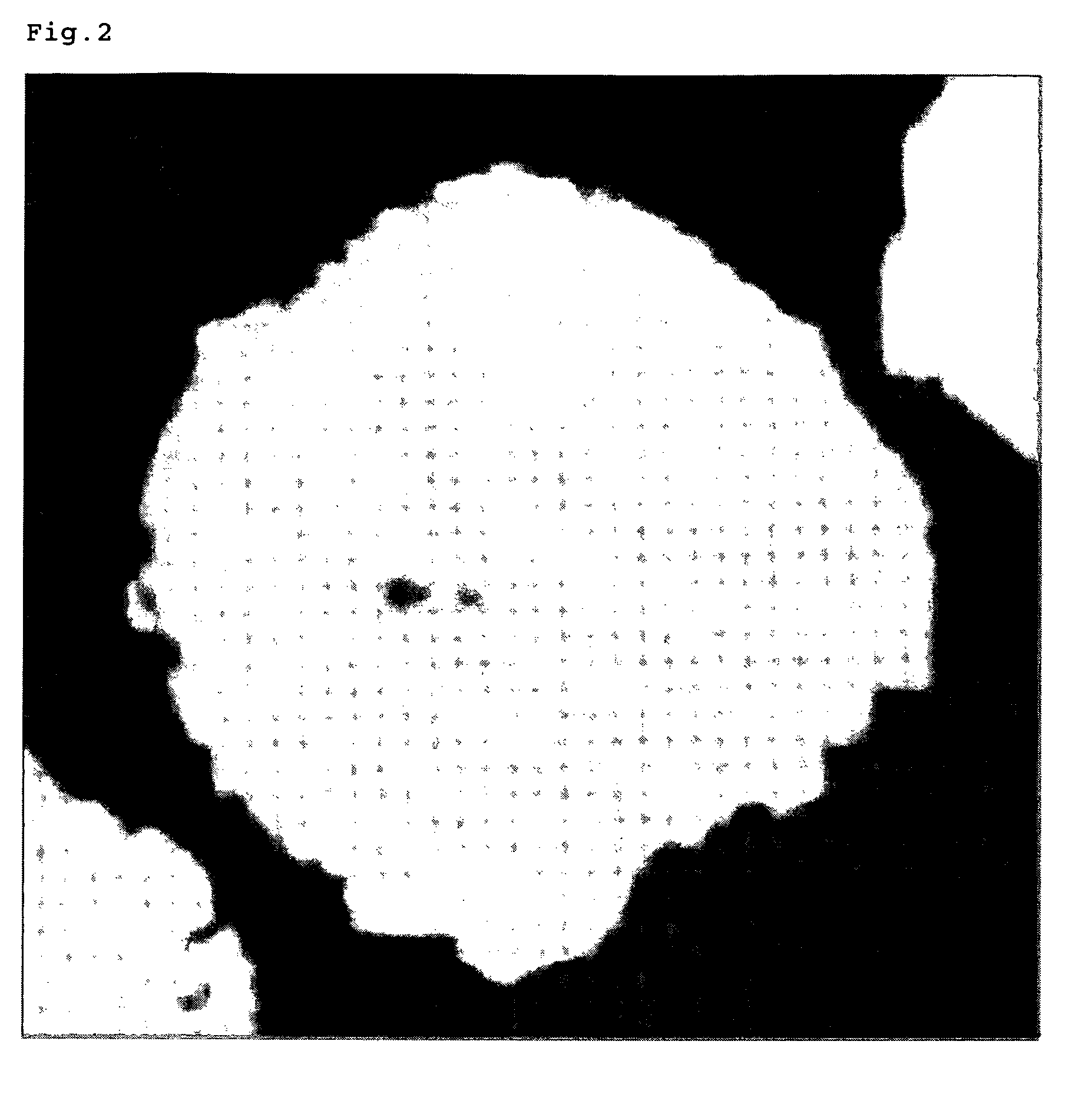Carrier for electrophotographic developer, and electrophotographic developer using the same
a technology for electrophotographic developers and carriers, applied in the field of carriers for electrophotographic developers and electrophotographic developers using the same, can solve the problems of reducing the effective carrier surface area, liable to decrease the tribocharging capability of toner particles, and charge leakage, and achieve excellent charge imparting capability and its stability, long life, and high strength
- Summary
- Abstract
- Description
- Claims
- Application Information
AI Technical Summary
Benefits of technology
Problems solved by technology
Method used
Image
Examples
example 1
[0128]Raw materials were weighed so as to become MnO: 35 mol %, MgO: 14.5 mol %, Fe2O3: 50 mol % and SrO: 0.5 mol %, and crushed by a wet media mill for 5 h to obtain a slurry. The obtained slurry was dried by a spray drier to obtain spherical particles. For adjusting the formed void degree, manganese carbonate as the MnO raw material and magnesium hydroxide as the MgO raw material were used. The particles were adjusted for the particle size, and heated at 950° C. for 2 h for calcination. Then, for obtaining a suitable fluidity together with a comparatively high void fraction, the calcined material was crushed by a wet ball mill for one hour using stainless beads of ⅛ inch in diameter, and further crushed for 4 h using stainless beads of 1 / 16 inch in diameter. An appropriate amount of a dispersant was added to the slurry, and for the purpose of securing the strength of particles to be granulated and adjusting the void degree, 2 wt % of PVA as a binder was added to the solid, and the...
example 2
[0133]A resin-filled ferrite carrier was obtained as in Example 1, except for using 750 parts by weight of a condensation-crosslinkable methyl-based silicone resin, 2 parts by weight of a conductive carbon (Ketjenblack EC, manufactured by Ketjen Black International) and 7.5 parts by weight of γ-aminopropyltriethoxysilane.
[0134]As a result of observation of the cross-section of the obtained carrier, the laminate structures were repeated six times, and about 95% of the outermost surface of the particle was coated with the resin. The characteristics were measured as in Example 1. The results are shown in Table 1.
example 3
[0135]A ferrite core was obtained as in Example 1, except that the amount of PVA was 0.65 wt % and the sintering temperature was 1, 145° C. The volume average particle size of this ferrite core was 34.8 μm.
[0136]Next, 600 parts by weight of the same condensation-crosslinkable methyl-based silicone resin as in Example 1, 2parts by weight of a conductive carbon (Ketjenblack EC, manufactured by Ketjen Black International), 5 parts by weight of γ-aminopropyltriethoxysilane and 500 parts by weight of toluene were mixed, and 2 mm zirconia beads were mixed and dispersed by a media mill.
[0137]A mixing vessel was charged with 1,000 parts by weight the obtained resin solution for filling and the above-mentioned ferrite particles, followed by stirring at 50° C. under reduced pressure to fill the ferrite particles with the resin solution. After the particles were fully filled with the resin, the resultant was heated to 70° C., and stirred for 30 min to volatilize toluene.
[0138]Thereafter, the r...
PUM
 Login to View More
Login to View More Abstract
Description
Claims
Application Information
 Login to View More
Login to View More - R&D
- Intellectual Property
- Life Sciences
- Materials
- Tech Scout
- Unparalleled Data Quality
- Higher Quality Content
- 60% Fewer Hallucinations
Browse by: Latest US Patents, China's latest patents, Technical Efficacy Thesaurus, Application Domain, Technology Topic, Popular Technical Reports.
© 2025 PatSnap. All rights reserved.Legal|Privacy policy|Modern Slavery Act Transparency Statement|Sitemap|About US| Contact US: help@patsnap.com


